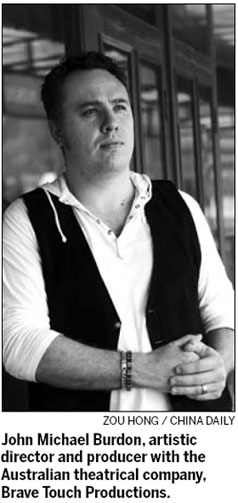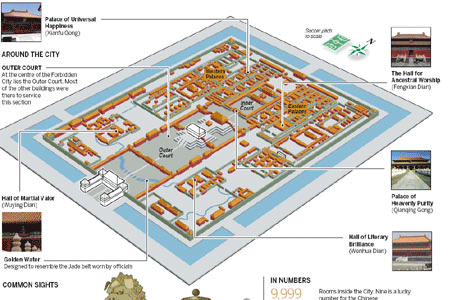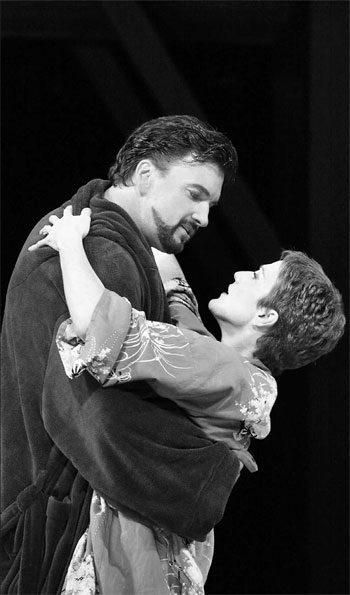Center
An old-fashioned classic
Updated: 2011-09-02 08:00
By Chen Nan (China Daily)
|
Kiss Me, Kate will give Beijing audiences the feel of an authentic 1940s musical. [Provided to China Daily] |
Kiss Me, Kate, comes to Beijing promising to offer audiences a feel of the golden age of Broadway musicals. Chen Nan reports.
Chinese audiences are not total strangers to Western musicals. Since 2002, audiences in Shanghai and Beijing have enjoyed Western musicals such as Les Miserables, The Lion King and Mamma Mia!. Beijing also staged a Chinese version of the Disney musical Beauty and the Beast in 1999. In early July this year, a Chinese version of Mamma Mia! opened in China, the first time a major Western musical was translated into Mandarin for a national tour.
"China is on the tip of everyone's tongue. It's emerging as a crucial territory on the global map," says John Michael Burdon, artistic director and producer with the Australian theatrical company, Brave Touch Productions.
Burdon is now in Beijing as production director and choreographer of Cole Porter's classic musical Kiss Me, Kate, which will debut at Beijing Exhibition Hall from Sept 22-25.
Structured as a play within a play, Kiss Me, Kate is about two divorced couples involved in performing a musical version of The Taming of the Shrew.
 |
The musical premiered in 1948 on Broadway, becoming the first Tony Award winner, and was revived in 1999.
For its Beijing debut, the production team sticks to the original script, costume, stage set, music and dance, to give local audiences the feel of an authentic musical of the 1940s.
"Kiss Me, Kate represents the golden age of the Broadway musical, and is different from modern musicals such as Cats and Mamma Mia!," the director says.
"The music is jazzy and has lots of piano. Unlike today's musical, which attracts audiences with dazzling stage designs and multimedia effects, Kiss Me, Kate is all about the story. Everything relates to that and connects to it."
Burdon grew up with musicals and watched Kiss Me, Kate when he was 10. He remembers being impressed by its comedy.
He says when he researched the Chinese musical market, he found that this genre was still somewhat new in China.
"It's a challenge to bring such an old musical to them," says the director.
To help them better enjoy the musical, the production team has added a five-minute fan dance to it, besides providing Chinese subtitles.
"We hope the audiences will connect to it despite cultural differences," Burdon says. "We believe (the language of) music and dance is universal.
Zhang Ligang, of Beijing Beizhan Performing Arts Culture, says they decided to bring in Kiss Me, Kate, because, "It is a milestone in the world of musicals".
"The Chinese have already watched many modern Western musicals. We wanted them to see something old-fashioned and classic."
The first Western musical the company brought in was Rent in 2006 and it broke even, thanks to the presence of Karen Mok, a popular Taiwan singer-actress.
But the other musicals that followed, such as West Story and Cats, were financial losses.
"Although the market has improved, we are still under pressure while introducing a musical," Zhang says.
Performance companies try to cater to local audiences by either inviting a local star, or adding some Chinese elements, to the show.
"Audiences are hungry for the art form, but just don't know how to enjoy it. It takes time," Zhang says.
He is confident of the box office prospects for Kiss Me, Kate, pointing to the eagerness of urban audiences to expand their entertainment options.
 |
Like Beijing Beizhan Performing Arts Culture Company, many other performing companies are interested in introducing more musicals in China, not only from the West but also homegrown ones.
Oriental Songlei Theater is one of those keen to push original Chinese musicals. The company's founder and music producer, Li Dun, made Butterflies in 2007, which became the first made-in-China musical to be staged in the United States.
"Many people in China are interested in musicals. But the history of musicals in the country is so short, compared to that in the West. It takes time for local audiences to really enjoy it".
E-paper

Unveiling hidden treasures
The Forbidden City, after the Great Wall, is the most recognized tourist site in China.
Short and sweet
Game for growth
Character reference
Specials

Hunting grounds
Opinion divided as China debates opening door to international players

Flying the TCM flag
A small German town is home to Europe's flagship clinic for traditional Chinese medicine

Animal attraction
World's youngest chief fur designer set to launch own label and tap into huge China market.

